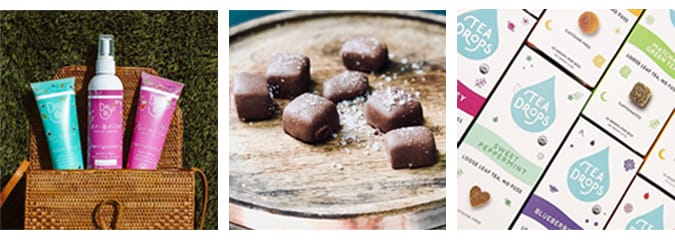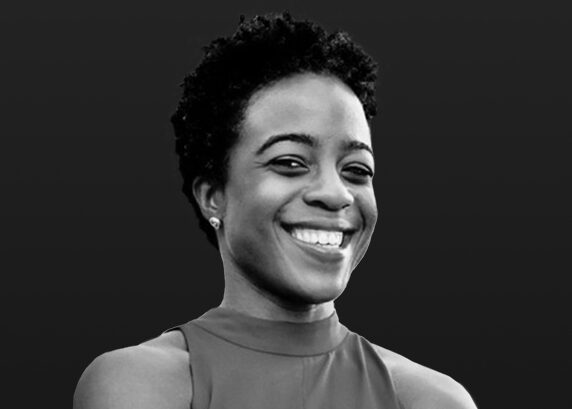Entrepreneurial Advice from Our Fellows | Tory Burch Foundation
Entrepreneurial Advice from Our Fellows
On community, starting a business, perfecting your pitch, finding investors, scaling manufacturing, and more.
32,532 Views
0 Likes
7 min read
Link copied to clipboard
From perfecting your pitch to tips for working with family – our three Tory Burch Fellows shared invaluable advice with each other when they chatted earlier this year. Read on to learn more about these entrepreneurs and what they’ve learned since starting their businesses.
Part of our first Tory Burch Fellows class, Kate McAleer (center) is the founder and owner of Bixby & Co., a craft confectionery manufacturing company on the coast of Maine. Thanks to an investment grant from the Tory Burch Foundation, Kate was able to buy much-needed equipment allowing her to expand Bixby & Co.’s product lines and increase capacity.
Dr. Paris Sabo (right) has dedicated her life to bringing safe, natural, and affordable oral care to everyone through Dr. Brite, a natural oral care manufacturer. As a small start-up, the investment grant from the Foundation helped Paris scale and purchase new equipment and re-brand her packaging.
The founder and CEO of Los Angeles-based Tea Drops, Sashee Chandran (left) is disrupting the tea industry with innovative organic pressed teas that dissolve in your cup. Sashee has used her grant from the Foundation to expand Tea Drops’ online presence and bridge connections with her consumers.
KM: As a fellow, I’ve learned so much more about leadership. How has the fellowship positively impacted each of you?
PS: Dr. Brite was new, just two years in business when we were selected! I have received so much help and advice from amazing mentors. We actually redesigned our whole brand because of the feedback I got. Overall the program has made me a better leader and Dr. Brite a better company.
SC: I agree, being a Fellow afforded me the opportunity to learn from thought leaders across so many different business and creative disciplines.
SC: Paris and Kate, you both have won a variety of pitch competitions. What do you both believe is the secret to the perfect pitch?
PS: Personally, for me, there is no real secret. You have about 30 seconds to get the attention of your audience and get your point across. It is important to be genuine, not filling your pitch with the now overused words like “disrupting” and “revolutionizing”. Be creative, have fun, and give your team the proper recognition they deserve.
KM: Research and practice are key! When preparing to pitch I research and review continuously. Knowing my numbers and practicing the ability to explain not only my concept but also how the execution will look is necessary. Practice with mentors, friends, even in front of your pets!
PS: Sashee, you took on outside VC funding for your business. When did you know it was the right time and how did you do it?
SC: About two years into running Tea Drops I realized I wanted to bring on investors. In order to scale at the rate I wanted to and hire the right team members, raising funding was necessary. Initially, it was important to me that I bootstrapped. It allowed me to be scrappy and see what channels worked for my business. Once I was ready, I approached early stage investors from angels to specialized venture capital groups. I also read a book about fundraising called Venture Deals by Brad Feld, which was super helpful to learn about the types of investment instruments available.
KM: And what was it like pitching to potential investors?
SC: I pitched to what must have been 70-80 investors to raise my first $1.9M. You learn a lot from each “no.” Because I did not come from the VC world, I had to learn how to pitch. I wasn’t great in the beginning, but each “no” got me closer to clarifying my story and – as counterintuitive as it might sound – gaining confidence.
You learn a lot from each “no.”
KM: Knowing your story as an entrepreneur is so important. My mother and I own Bixby & Co. Together, and I think having the best of both generations really gives our business a breadth of experience. Paris, you co-founded Dr. Brite with your sister – how do you both manage family and business?
PS: My sister and I are very close and our families are very close. We know each other’s strengths and weaknesses, and we have absolute trust in each other and the roles we each take on for the business. But we also respect each other’s need for time away. We plan vacations so that we are not constantly working when we are supposed to take time off. Our relationship as sisters – along with the fact that we both trained as medical professionals in male-dominated fields – has helped us run and grow Dr. Brite over the past three years.
SC: What is the most challenging part of working with your sister? How do you overcome that?
PS: The most challenging part is that we know everything about each other. Sometimes, when we disagree, we know exactly which buttons to push to get our way, which gets tricky. We also need to be told to stop talking about Dr. Brite. We talk business at family dinner parties, when we see each other on weekends, and when we go home at night – more than 15 hours a day, which can be exhausting. But at the end of it all, we have a common goal to make Dr. Brite the world’s most trusted brand empowering a conscious way of life.
KM: Paris, I heard that, like me, you used the fellows program grant to scale manufacturing. What are your top tips for other entrepreneurs looking to scale?
PS: First, use good manufacturing practices as soon as possible. It is much easier to implement written protocols when you have a team of two than it is after you’ve grown to 100.
Secondly, invest in your growth by purchasing the equipment you need to scale. We bought a large planetary mixer with a portion of our Tory Burch Foundation grant investment, making our toothpaste manufacturing more efficient to meet demand. We also purchased our first automated filling machine that fills, labels, and caps over 1,200 bottles of mouthwash an hour. Our manufacturing consistency and production times have improved significantly as a result!
Lastly, don’t be afraid to move towards 3rd-party manufacturing when you need it. We have a few 3rd party manufacturers that we are building relationships with now, even though we aren’t using them yet, in anticipation of our growth. At some point, outsourcing part of (or all of) your manufacturing will make sense. It is good to be prepared and ready for when the time comes.
 PHOTOGRAPHS COURTESY OF @DRBRITENATURALS, @BIXBYCO, & @MYTEADROP.
PHOTOGRAPHS COURTESY OF @DRBRITENATURALS, @BIXBYCO, & @MYTEADROP.
KM: Both of you have strong branding. How did you develop your identity and what would you suggest other entrepreneurs developing a brand identity think about?
SC: We started by reflecting on what we stood for and why our customers felt connected with us. I thought a lot about what the core things were that made us, well us! Being woman-owned and American-made were key. I suggest all entrepreneurs start by thinking about their origin story. What feels core to who you are? For us, it was our Californian roots and the inspirational women from the 70s. After that, identify the colors that resonate for your brand. We knew bright palettes and bold fonts that evoked a psychedelic and happy vibe would suit our brand well.
PS: When my sister and I founded Dr. Brite, we had an amazing product, but not a big branding budget. We researched our competition and, using our own in-house graphic designers, we created our first logo, packaging, and brand. Starting off scrappy was helpful. When we were ready, I got feedback from as many people as possible on how to rebrand. We asked for feedback every step of the way to ensure our new look would resonate with a wider market of customers.
We asked for feedback every step of the way.
KM: I’m so grateful to learn from you both and to be a part of the foundation’s community of women. How do you both prioritize staying in touch with other women entrepreneurs?
SC: At Tea Drops, we actually have this fun weekly feature called ‘Boss Babes’ on our Instagram where we highlight awesome women doing amazing things. I think it is so important to amplify the work other women are doing! It only helps all of us grow as a community.
PS: I love the group of ladies that I met through the Tory Burch Foundation Fellowship. I am blessed and so lucky to call some of these fierce entrepreneurs my friends. We have visited with each other, some of us traveled together, and we keep in touch through regular texts and calls.
Help an entrepreneur by upvoting


